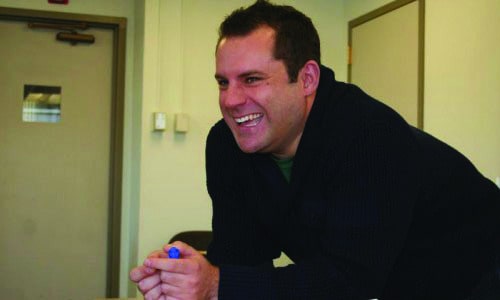By Hollis Griffin, Ph.D.
Special to the Denisonian
LAST WEEK, THREE STUDENTS planned an elaborate April Fools’ Day prank wherein they would switch their majors from Physics to Communication. The joke here being “who would ever switch their major from Physics to Communication?!” I’m not entirely certain who was supposed to be laughing. In any case, they did little more than make additional work for staff people who weren’t all that amused. As an April Fools’ Day prank, this one was both myopic and arrogant. It seems all too illustrative, of larger mores that operate at Denison related to academic rigor and pre-professionalism. In my brief time here, I am struck by how often members of this community dismiss the Communication department as being home to “easy” courses and a “blow-off” curriculum.
I won’t go so far as claiming offense—the physicists would have to do better than that—but it concerns me. These are uncertain times for undergraduates. As students confront a tight job market and rising student loan debts, selecting a course of study can feel particularly fraught. Often, undergraduates hope that their departmental affiliation will route them to a particular employment track after graduation. In such a milieu, majors with well-defined paths to post-college employment enjoy a certain amount of prestige. Students seem to think that specific courses of study will inevitably lead to “the good life.”
Like anything else, sometimes those courses of study deliver on their promises of happiness and prosperity and sometimes they don’t. Alas, lives are rarely so linear. During my freshman year of college, I thought I was going to be a labor lawyerafter college. As luck would have it, I graduated four years later with a passion for creative writing; I was absolutely convinced I was going to be a novelist. Even so, I ended up working as a publicist for a long time. A few years after, I got a doctorate in film and now I’m a professor here. I love that too. I had no idea I’d do any of these things, mind you, but I never would have done any of them had I stuck with Plan A. I would have missed out on a lot of things had I done that.
I think the beauty of the liberal arts experience can get very, very lost in the conversations I hear so often at Denison related to “how does this major lead to a ‘good job’ after graduation?” I am not so naïve that I think undergraduates willall have the luxury of learning for learning’s sake. But the future—especially your futures—will be very uncertain, require much adaptation, and necessitate a great deal of creativity. The skills you develop and the knowledge you accumulate at Denison will not always lead to careers in straightforward ways. Students would do well to recognize and become more comfortable with that. Not only would it lead to more inspired April Fools’ Day pranks, but it would also allow them to understand why, exactly, the liberal arts are such a good place to prepare for a future—whatever that future might look like—at this particular moment in time.
I won’t stoop as low as the April Fools’ Day pranksters and claim that Communication is “a better major” than Physics. Because, really, what is “better,” exactly? For a college that prides itself on educating “autonomous thinkers, discerning moral agents and active citizens,” why is it that our notions of success after graduation are so connected to the marketplace? Is material prosperity really the only benchmark describing the impact of this college on your life? I can only hope that Denison students have broader visions and deeper commitments. My grandfather told me: “do something you love, you’ll figure out the rest as you go along.” So, if you love physics, go rock that, but the straight path is often a boring one. He also used to say: “you can’t take it with you when you go.” That’s something we talk about a lot over in Higley. When the physicists get bored in lab, they know where to find me.

